2019.04.10
Creating a Word Web of your Own
Written by Dr. Chris Merkelbach and Ms. Judy MacKinnon
One of the problems of learning a foreign language is that we often can't remember words we have just heard and learned. Sometimes it even happens with words we think we know well but haven't used in a while. It's a problem for everyone who is learning a foreign language. A common cause of this is that students use ineffective techniques to remember words. But what is an effective technique? To determine which memorization strategies are effective and which aren't, you first must understand how the brain organizes words.
We keep a treasure of words in our brain, and it is organized so that we can retrieve the words we need quickly. Our brain organizes words in several ways: coordination, collocation, hyperonymy, hyponomy, and antonomy. Coordination means that two or more words are coordinated at the same level. For example, milk and sugar, or black and white are cordinated at the same level. Words such as these are mostly connected by words like and or or. Collocation means that words occur with another word on a regular basis: I might ask you to keep a watchful eye, but I'd never ask you to keep an observant eye! Hyperonymy and hyponomy relate to the order of several words. For example, rose, tulip, orchid are hyponyms of the word flower, whereas animal is the hyperonym of cat, dog and goldfish. Some examples for antonyms are polite vs. rude, or singing vs. speaking. Please note that the antonym of a word might depend on the situation. Old can be the opposite of fresh, young, or new. So, your brain would organize these words in relation to the topic or situation. If you were talking about bread, your brain would retrieve old and fresh. If you were talking about people, it would retrieve old and young. If you were talking about clothes, it would retrieve old and new.
In addition to this manner of order, all words and word groups are linked to each other in our mind. They are attached by something like in a big, three dimensional web. In fact, there is only one big web for all the words of all the languages we speak -- not one for Chinese, one for English, and one for Spanish. All the words in any language are interrelated. If we want to remember a word, we have to anchor it to a position in the net and connect it to the words next to it. Take a small self-test: Ask two different friends to tell you a word in your mother tongue: sunshine and Christmas. Those two words seem to be unrelated, right? But you can come up with a sentence within seconds where both words are meaningfully related to each other: At Christmas, there is enough sunshine in Australia to get a suntan at the beach. So, a connection does exist for these words in our brain. We can do this with any two words of our native tongue. Therefore, we should be able to do it with words from a foreign language as well.
Now that you know some necessary background information, you can choose strategies which coincide with and build upon the way our brain works. Here are some examples of such strategies. They are easy and will help you attach the words to the web in your mind, thereby aiding your ability to recall the words:
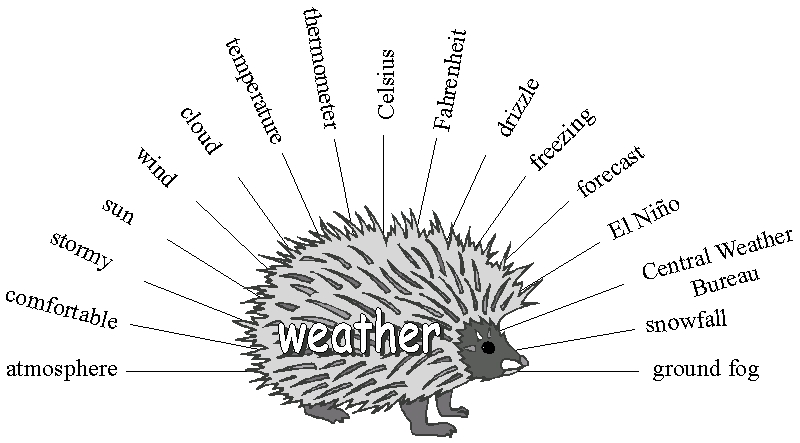
Word-Hedgehog
This is a good activity for people who have just started to learn a foreign language and still do not know very many new words. Choose one topic (e.g., weather) and write it in the body of the hedgehog (see Picture 1). Whenever you learn a new word related to the topic, add it to the hedgehog. Then you can add more and more needles with words related to the topic word. Please note that your hedgehog will look different from your friend's hedgehog.
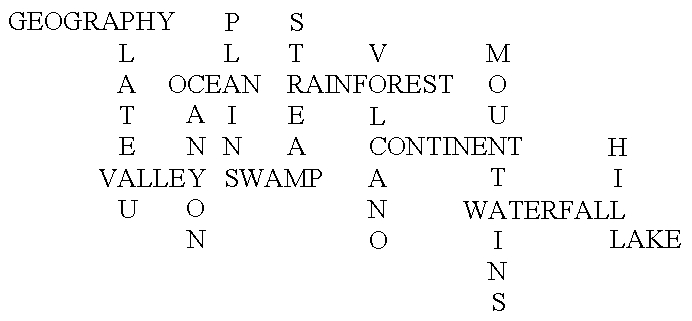
Word-Snake
You need a long slip of paper. You could make one by cutting an A4-size paper into 4 long slips and gluing them together. The rest of the activity looks a lot like Scrabble: think about one topic (e.g., geography) and use it as a starter. Connect another word related to the same topic, as shown in Picture 2. You can proceed with this activity until both sides of the paperslip are fully used. The words can be nouns, adjectives, verbs, etc.

Word-Stairs
Many meanings of words are related to each other in a gradual manner. For example, maybe you have a list of adjectives which describe height such as short, fairly short, medium height, pretty tall, and tall. Write them down in a way so that they look like a staircase (see Picture 3).
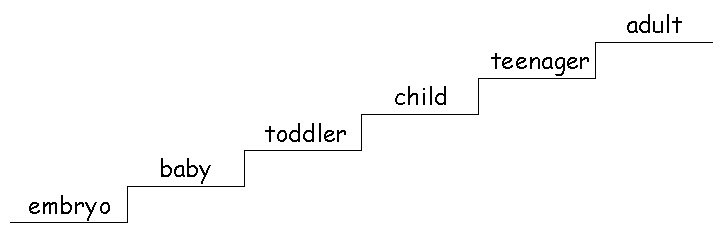
There are many different things which can be organized in this way such as the words a baby, a child, a teenager, an adult. Later, you might learn the word toddler, which could be added between baby and child, or the word embryo, which would be added before baby (see Picture 4).

Classification Map
This is another way to organize words to aid your recall. To create a classification map, you organize related words into even smaller categories. For example, you could organize all of the colors you know into 「light colors」 and 「dark colors」 (see Picture 5) or all of the animals you know into 「animals that fly」, 「animals that walk」 and 「animals that crawl.」 The number and type of categories is up to you. You should keep your classification maps on hand and add to them whenever necessary. As they grow, you'll probably see different ways to reorganize them to increase their effectiveness and further facilitate your memory.
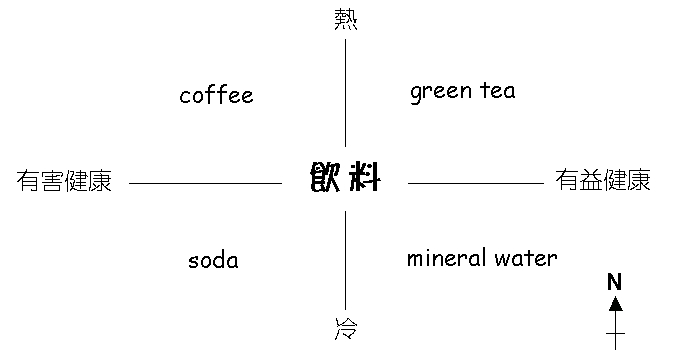
Word-Compass
In this strategy, you divide a group of related words into overlapping categories. Here is an example for vocabulary relating to beverages. First, to understand this, you have to think of a compass. A compass is labeled north, south, east, and west. The compass is divided into northeast, southeast, northwest, and southwest. If you changed north to the word hot, and south to the word cold, and then changed west to unhealthy and east to be healthy, you'd have four categories: hot-healthy, cold-healthy, hot-unhealthy, and cold-unhealthy. Then you could add beverage vocabulary to the appropriate category (see Picture 6). The labels for the categories you choose would depend on the group of words you were trying to remember. For example, if you were trying to remember adjectives for people, your categories might be adjectives for personality, adjectives for appearance, adjectives that are positive, and adjectives that are negative.
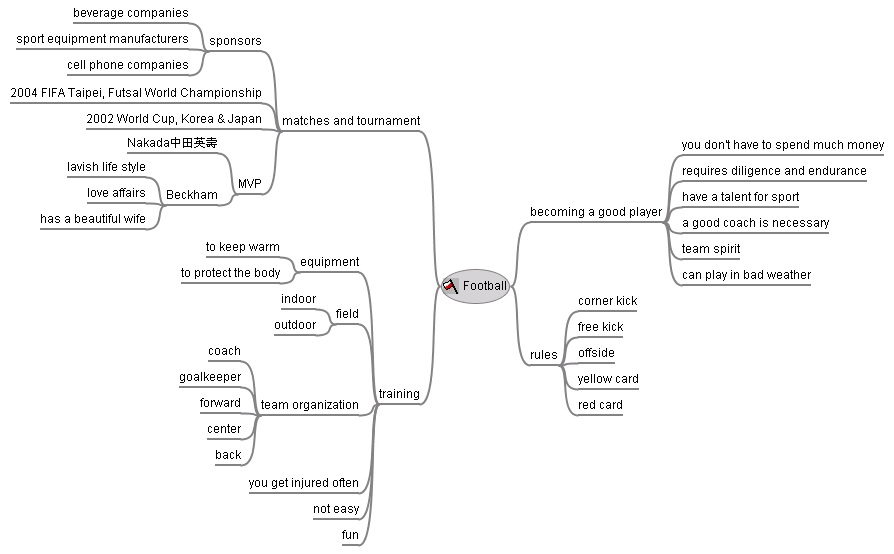
Mind Map
It was developed by Tony Buzan in the late 1960's. The basic idea of a mind map is to connect related words with each other on a piece of paper (see Picture 7). This strategy can be used mono-, bi,- or multilingual. It has the advantage that the words and their meanings are connected to each other across languages, and it becomes easier to switch languages later. In addition, you always can look up words you only know in one language in the dictionary and add them to your mind map. You can also include rules of usage or whatever information you want, and you can use pictures to represent ideas. Use different colors to make the mind map more understandable. For example, you could use blue for the vocabulary, green for collocations or usage tips, and red for common errors. Then, you could use the words you have included in your mind map once in a while to tell yourself or your partner a story about the topic. Keep your mind maps on hand and add to them or re-do them whenever necessary. But please note that each learner's mind map will look different from everyone else's since everybody has different ways of organizing reality in her/his mind. This strategy has been proven quite effective for advanced learners, but intermediate learners are also strongly encouraged to try it.
References: http://www.mind-map.com and The Mind Map Book written by Tony Buzan and Barry Buzan in 1996.
